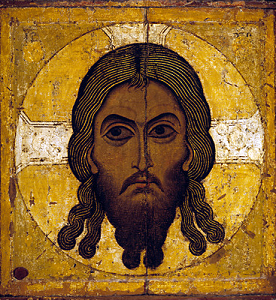
How is one to understand St. Isaac the Syrian's saying
For it is not possible, when we are faring on the way of righteousness, for us not to encounter gloom, and for the body not to travail in sickness and pains, and to remain unaltered, if indeed our love is to live in virtue.[1]?Attention is drawn to the qualifying phrase love is to live in virtue. The attitude of love is to be lived by filling one's own consciousness, with the content beloved by which means the qualities of the beloved become incorporated into every aspect of one's life. Joy is the experience life in love, the wonder of being transformed into a new person by in ways that were previously outside ones will and creative abilities. Conversely, the experiences in the failure of human relationships is total devastation, an authentic foretaste of death, for part of the soul is being separated from the body of life.
St. Isaac, however, goes beyond the model of purely human relationships by the additional direction that our living is to be done in the context of virtue, that is life-giving strength of character. The life-giver is, of course, the Christ the Jesus, who, by his encounter with Death, has destroyed the very possibility of the death that comes from estrangement from the creative reality of God.
He who is the ontological foundation of life-giving strength, of virtue, out of the natural desire of love is intimate with creation. Moreover, being the individual particular case, intimacy precludes any element generality. As such, the God, the saviour from death, the Jesus, is not a general life-giver, but very specifically, the giver of life to each person, as such, is ones most inmate lover, the one who fills the vessel ones life with the content, and giving it fruitful satisfaction.
He who is the ontological foundation of life-giving strength, of virtue, out of the natural desire of love is intimate with creation. Moreover, being the individual particular case, intimacy precludes any element generality. As such, the God, the savior from death, the Jesus, is not a general life-giver, but very specifically, the giver of life to each person, as such, is ones most inmate lover, the one who fills the vessel one's life with the content, and giving it fruitful satisfaction.
As with any relationship, partners work on themselves in such and such ways as to promote and maintain their own desirability. In the case of Jesus the Christ, the work is finished with the entry into Death, nothing more can be done by God to make Himself attractive to us than than creating the opportunity for eternal life with Him through destroying the power of the enemy (death being the power of the Evil One).
In the case of those desiring to enhance their intimacy with this Jesus, however, one must struggle against those acquired qualities that repel our Lover, thus become more attractive to Him. This is difficult work in which frequent failure and disappointment with the outcome of our effort, or experiencing the consequences of neglect, or a spirit of wilful rebellion born of impatient striking out at limitations inherent in the self, are both normal and sufficiently powerful to lead to hopelessness that is the beginning of despair through the practice of despondency.
In order for the will of God, that each should be saved, that is each experience liberation into a life of love, to be achieved there must be trials, difficulties, tribulations, and temptations. Deprived of struggle there is no achievement, there is no award for having done nothing to further one's own cause. Success is the outcome of an exercise of will power. The will is empowered by hope, by sense of duty, by binding obligation, each having origin in desire.
Consequently, asceticism aims at focusing desire on that which promotes hope by cutting off all that is false:
- The self, which is subject to death
- Imaginative interpretations the ignoring of reality, which is hypocrisy
- Material attachments, which is idolatrous lust in worshiping entities as tools and innovations as expressions of power
- Self-will, which is gluttonous activity isolating needs and desires in the self and judged against others
That, limiting receptivity of the the love of God by filling it the self with otherness, which is uncleanness, and perverting natural hope and extinguishing desire for the Lover, one betrays the bonds of love, redirecting activity against its organic purpose.
In short, to
live in virtueis to enter into the ascetical cultivation of love, the cultivation of the desire to enter into the joy that comes from being defined for, and by, one's singular, authentic lover, how transforms us into a dwelling place the righteousness that flows from His own nature

Prayer of St.Ephrem the Syrian
O Lord and Master of my life, grant not unto me a spirit of idleness, of discouragement, of lust of power, and of vain speaking.
But bestow upon me, thy servant, the spirit of chastity, of meekness, of patience, and of love.
Yea, O Lord and King, grant that I may perceive my own transgressions, and judge not my brother, for blessed art Thou unto ages of ages.
[1]St. Isaac the Syrian Ascetical Homilies of Saint Isaac the Syrian, Homily 59, p. 429; trans. D. Miller, second revised edition, Holy Transfiguration Monastery, ©20011,